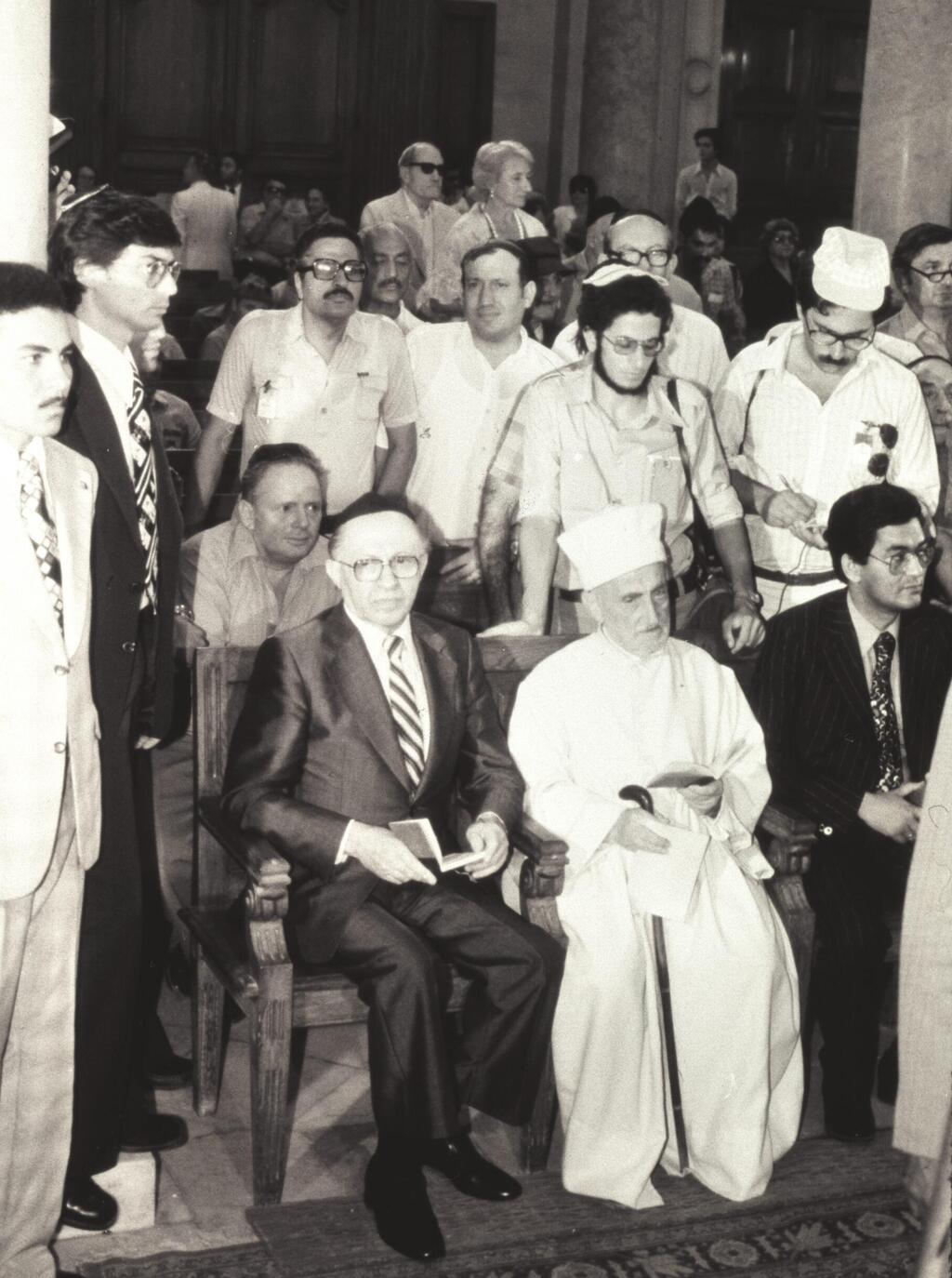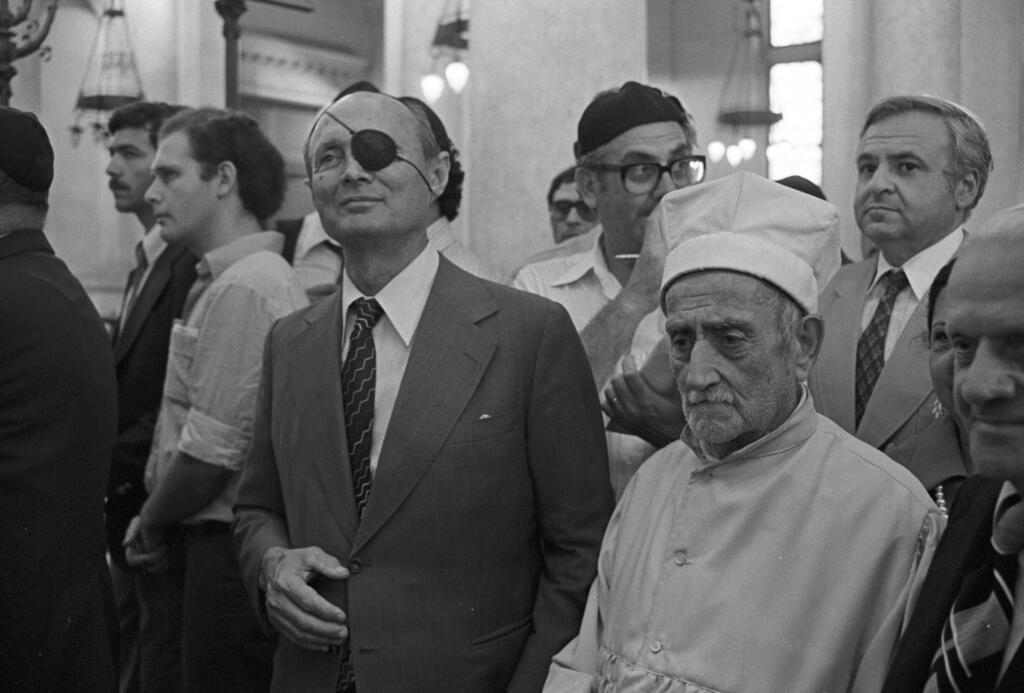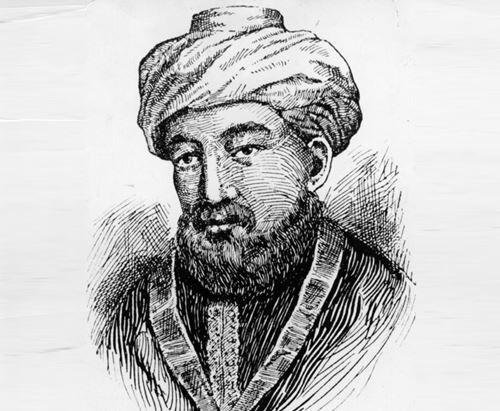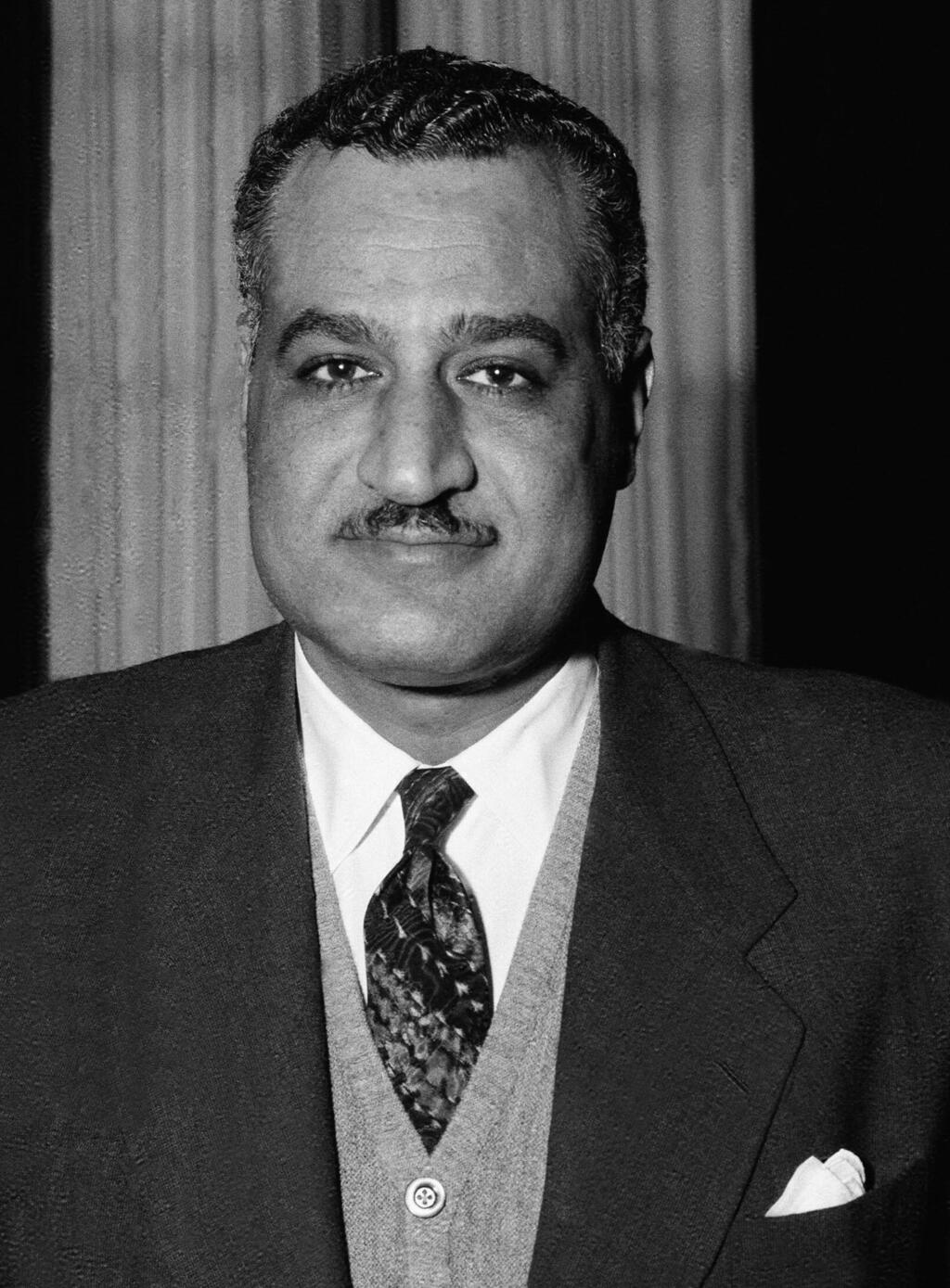Here is the story of an ancient community that played an important role in the history of the Jews. The Jewish community in Egypt existed continuously for 2,500 years until its decline and mass expulsion under Gamal Abdel Nasser in the 20th century. Only a few lone Jews presently live in the country next door.
The Jewish community that lived in Egypt until last century was extremely diverse. “Some Jews held high positions. Others played in sports teams. There were bankers, merchants, publishers, singers, film producers and directors,” says Ronit Marco, curator of the Digital Heritage Archive of Egyptian Jewry at Haifa University Library.
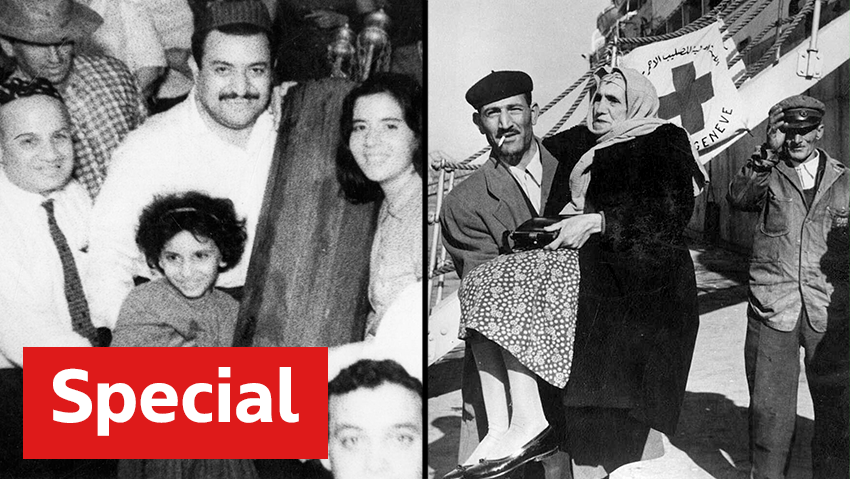
“The community was very organized and was known for its mutual support in time of need. Relationships were forged between the Alexandria and Cairo communities including letters between the two cities’ rebbetzins (regarding granting a get). During the Second World War, as Alexandria was bombed as part of the battle of El Alamein, its Jewish residents fled to Cairo and stayed in guest houses, homes and school classrooms.”
“The community included those arriving from Europe as well as North Africa. Most of the Egyptian community were doing well financially, but some were less well off,” adds Prof. Tamar Zewi, head of the Joseph & Racheline Barda Chair for the Study and Research of Jewish Heritage in Egypt and of the Center for the Study of the Jews of Spain and Islamic Lands: Past and Present at Haifa University.
Jewish People to Egypt dates back to 1000 BCE
Jewish tradition connecting the Jewish People to Egypt dates back to 1000 BCE. The Book of Genesis regales how famine in Canaan sent Abraham down to Egypt. Genesis goes on to tell us how Joseph was sold into slavery in Egypt and how his brothers, Jacob’s sons, went to Egypt for food in times of drought.
The Book of Exodus starts with Jacob’s descendants’ migration to Egypt and takes us through to the enslavement of the Children of Israel and the Exodus story – which is why we celebrate Passover.
12 View gallery
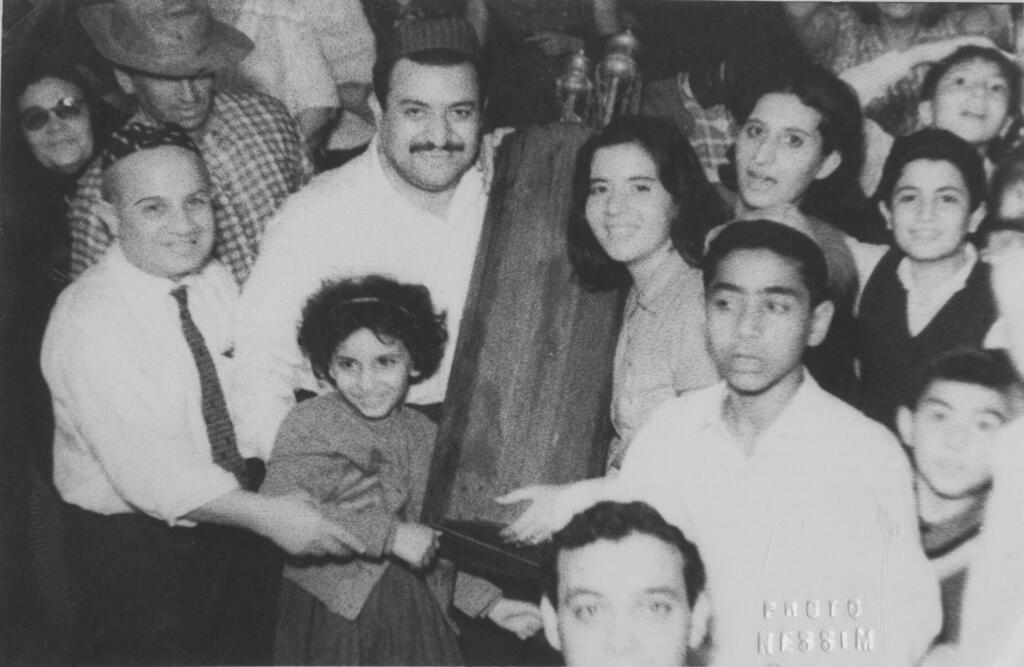

A celebration at the synagogue in the city of El-Mahalla El-Kubra, Egypt, 1967
(Photo: Fortuna Asher Collection, the Digital Archive for the Preservation of the Heritage of Egyptian Jewry, Younes and Soraya Nazarian Library, University of Haifa, in collaboration with the Joseph and Racheline Barda Chair for the Study and Research of Jewish Heritage in Egypt)
The Bible tells us that Solomon’s wives included Pharoah’s daughter, attesting to friendly relations with Egypt during the time of the United Kingdom of Israel. Egypt, the Bible claims, served as a refuge for rebels against the kings of Judah, and there were alliances between the Kingdoms of Israel and Judah and Egypt. The Book of Jeremiah describes the emigration and settlement of a group of Judahites in Egypt following the murder of Gedaliah ben Ahikam, the Babylonian governor of Judah, in whose memory we mark the Fast of Gedaliah.
“The Book of Jeremiah describes an ancient Jewish community existing in Egypt with roots predating the Judahite émigrés: the Jewish community on the island of Elephantine along the River Nile in southern Egypt in the Aswan region,” explains Prof. Zewi.
She says that this was a colony of Jewish soldiers, some of whom had moved there to serve as border guards for Egypt’s southern border even before the destruction of the First Temple.
12 View gallery
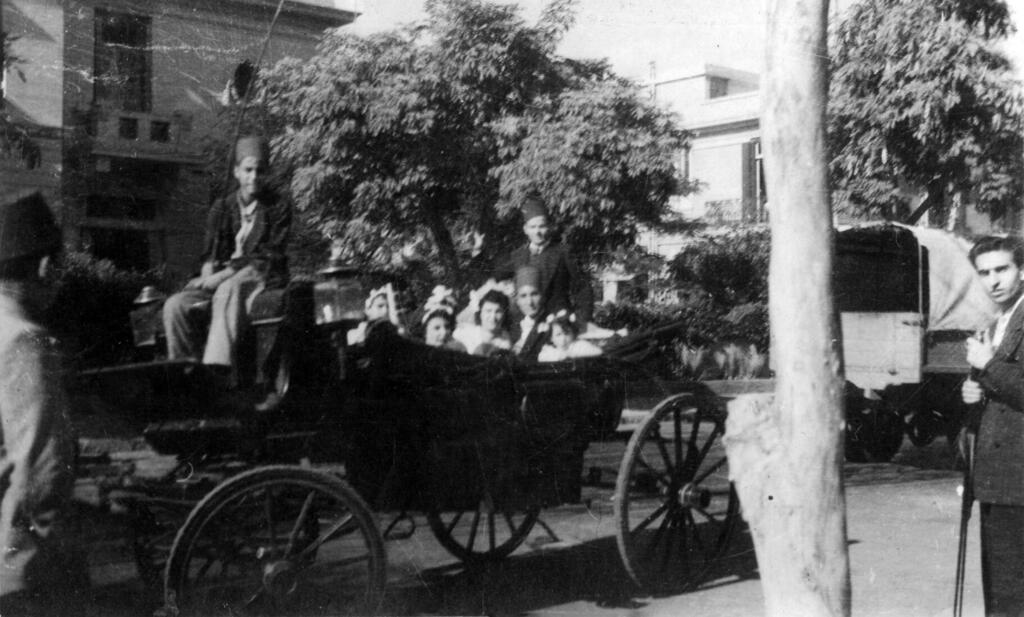

Jewish bride and groom, riding in a carriage on their wedding day in Cairo
(Photo: Fortuna Asher Collection, the Digital Archive for the Preservation of the Heritage of Egyptian Jewry, Younes and Soraya Nazarian Library, University of Haifa, in collaboration with the Joseph and Racheline Barda Chair for the Study and Research of Jewish Heritage in Egypt)
“The Jewish community based around this Jewish army corps lived here for centuries during the Persian period and built a temple on the island of Elephantine. This temple, however, was later destroyed due to a dispute with the local Egyptian community,” she says.
During the Hellenistic period, a sizeable and vibrant Jewish community lived in Alexandria. Its third-century synagogue is even mentioned in the Talmud.
12 View gallery
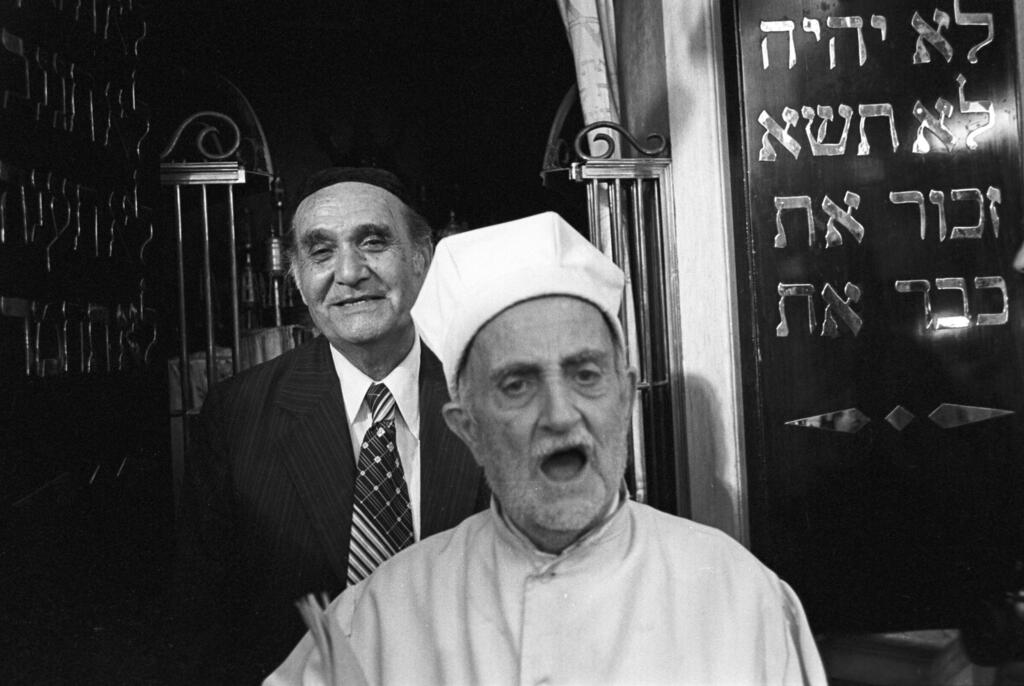

The rabbi of the synagogue in Alexandria during a prayer service, 1979
(Photo: David Rubinger)
A notable figure in this community was Jewish Hellenistic philosopher Philo, known in Hebrew as Yedidya and mentioned in the works of Flavius Josephus. His writings in Greek included Torah interpretations in accordance with Greek allegoric methods and Greek philosophical ideas are only one part of the extensive literature produced by the Jews of Egypt. Sadly, only a small part of this work has survived.
The Jewish community in Alexandria absorbed Jewish refugees after the destruction of the Second Temple in 70 CE and their sages communicated with the sages in Yavneh in the Land of Israel.
Jews in Egypt
(Video: The Zionist Archive, Levana Zamir, International Association of Jews from Egypt )
“We also know that sometime between 170 BCE and 154 BCE, a further temple was built at Leontopolis in Lower Egypt, probably by Onias IV of the Zadokite priestly dynasty after losing the priesthood in Jerusalem and fleeing to Egypt,” explains Prof. Zewi.
“The temple’s building is particularly interesting. The exterior does not resemble the temple in Jerusalem, but the altar and the holy objects it contained, were modeled after the temple in Jerusalem, except the menorah. The temple stood for 234 years and was destroyed by the Romans.”
"Protected persons” under Muslim rule
The Jewish community in Egypt remained steadfast, even following the Arab-Muslim invasion of 640 CE, and was heavily influenced by Muslim culture. Alongside further sources, the Cairo Geniza (a collection of manuscripts and Jewish books found in the Ben Ezra Synagogue in Fustat, ancient Cairo) sheds light on Medieval Jewish community life and how the Jews lived as “protected persons” under Muslim rule.
The Geniza – a treasure that contributed enormously to the study of Jewish writing and poetry – was discovered almost by accident by Cambridge University's Prof. Solomon Shechter at the end of the 19th century.
Prof. Miriam Frenkel, head of the Ben-Zvi Institute for the Study of Jewish Communities in the East notes “The Cairo Geniza reveals active and creative Jewish life in Egypt. Most Jews were concentrated in the big cities of Fustat (adjacent to Cairo) and Alexandria, but there were also communities in villages along the Nile Delta in northern Egypt," she says.
"The communities led autonomous lives with almost no intervention from Muslim authorities. The Jews were free to conduct their lives in keeping with their faith’s commandments and appoint their own leaders.”
“The Geniza teaches us about organized and prosperous community life in several fields,” says Marco. “Not everything has yet been deciphered, but from what has, we learn about both secular and religious lifestyles.”
Frenkel says that Jewish immigrants came from the Maghreb (North Africa), the Land of Israel, Syria and from as far afield as Persia and Iraq. In the 13th century, European immigrants also showed up. There were also rare periods of persecution, such as under al-Hakim bi-Amr Allah during the Fatimid Caliphate. These persecutions weren’t aimed solely at the Jews, but rather at all Dhimmi – Jewish and Christian subjects alike.
synagogues in Cairo and Alexandria were torched
A further prominent figure in the history of the Jews of Egypt was 9th-10th century CE sage Saadia Gaon. “He was born in Egypt’s Faiyum Province and dedicated his life to translating and interpreting the Hebrew Bible, Hebrew grammar, philosophy, Hallacha, composing piyyutim (liturgical poetry) and editing the siddur (prayer book,)” explains Prof. Zewi, who further notes that Saadia Gaon was involved in various disputes, including the disputation with the Karaites – initially in Egypt, but later also in other places around the globe.
12 View gallery
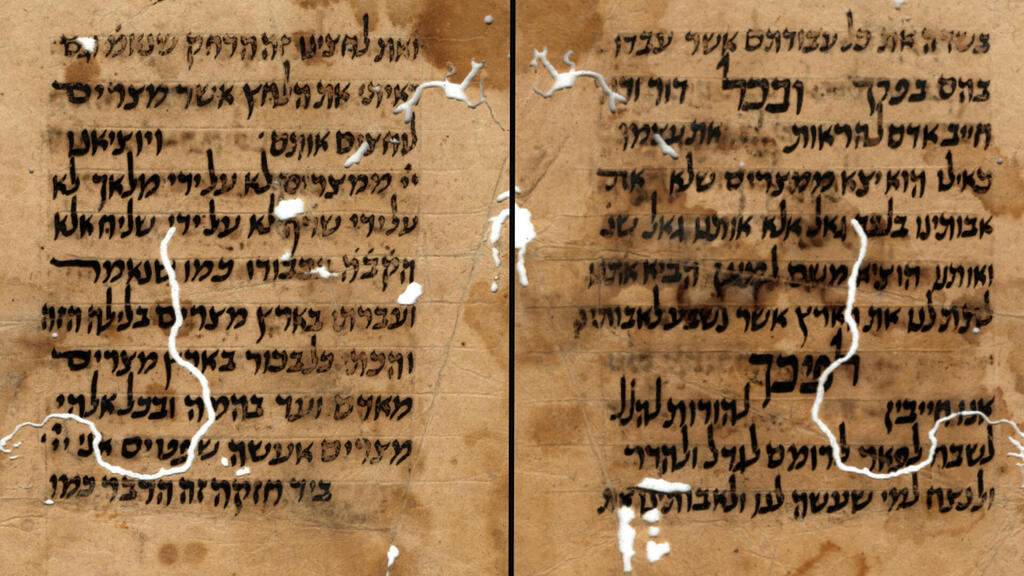

Two sections from the Haggadah, preserved from the Cairo Geniza
(Photo: Younes and Soraya Nazarian Collection, University of Haifa, Wikipedia)
Maimonides was the most important figure to operate in Egypt. Rabbi Moses ben Maimon (1138-1204 AD) was born in Cordova, Spain and later settled in Egypt. He was a physician and philosopher and his writings on Hallacha and faith are studied in all communities in Israel. “Maimonides served two terms as Rais el Yehud (head of the Jews), the spiritual leader of Cairo’s Jewish community,” says Prof. Zewi.
There was a Karaite community in Fustat for centuries, and then in the new city of Cairo and further centers across Egypt. For centuries, the community operated in the Ben Ezra Synagogue where the famous Cairo Geniza was discovered. The synagogue was later transferred to rabbinic hands.
The 1492 expulsion of the Jews from Spain caused waves of Jewish immigration to Egypt. “Alongside the Jewish Arabic dialect, Ladino also took root as a language used by Jews in Egypt,” says Zewi.
In the 19th century, as Jews became more involved in public life in Egypt, problems arose that Prof. Zewi says stemmed from the rise of modern Egyptian nationalism. Several synagogues in Cairo and Alexandria were torched in 1882, a few short months before Egypt was conquered by the British.
A severely diverse community
With the British takeover, institutionalized discrimination against minorities, including Jews, was officially banned in Egypt. “The opening of the Suez Canal in 1869 and more importantly, the British conquest, increased Jewish migration to Egypt from across the Mediterranean, Central and Eastern Europe, as well as from North Africa,” explains Prof. Zewi.
12 View gallery
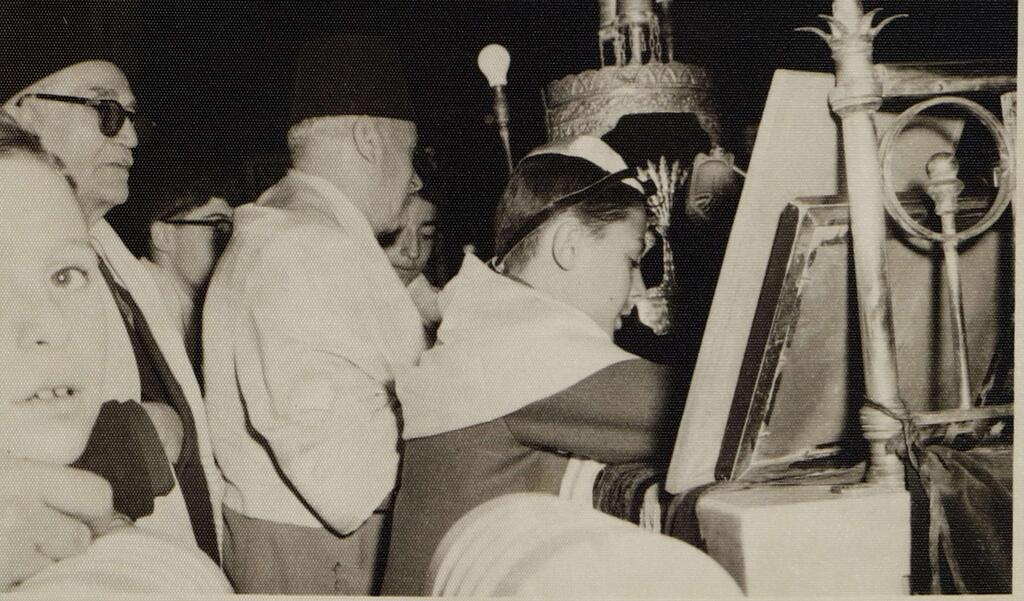

A ceremony of laying tefillin at a synagogue in Cairo with Rabbi Shmuel Chamui and Chief Rabbi Chaim Nahum Effendi
(Photo: Vered Alpert Collection, the Digital Archive for the Preservation of the Heritage of Egyptian Jewry, Younes and Soraya Nazarian Library, University of Haifa, in collaboration with the Joseph and Racheline Barda Chair for the Study and Research of Jewish Heritage in Egypt)
This immigration wave made the community far more diverse. “On the one hand, modern life developed. The Kol Israel Haverim educational organization opened at the end of the 19th century and children of well-heeled Jewish parents were sent to French and English schools. Jewish newspapers were founded and cultural life blossomed with a Jewish theater opening in Cairo in the late 19th century," says Prof. Zewi.
"On the other hand, the various immigrant groups retained their own separate educational institutions along with all their differences. Not everyone in Egypt’s Jewish community had Egyptian citizenship, some retained their original citizenship.”
12 View gallery
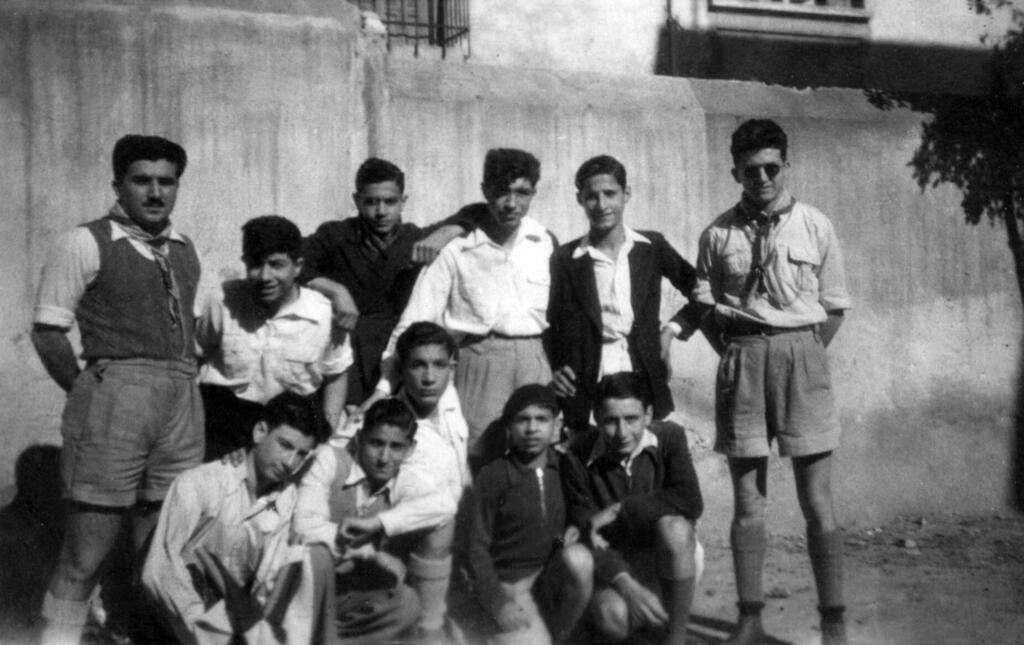

Jewish boys in Alexandria
(Photo: Gila Naftali Collection, the Digital Archive for the Preservation of the Heritage of Egyptian Jewry, Younes and Soraya Nazarian Library, University of Haifa, in collaboration with the Joseph and Racheline Barda Chair for the Study and Research of Jewish Heritage in Egypt)
Zionist activity first began in Egypt at the end of the 19th century. “The Zionist movement was active until the 1930s, in which time, Jews learned Hebrew songs, read Hebrew literature and even danced the Hora – all led by madrichim from Israel,” Marco tells us. “The Muslim Brotherhood started making headway in the 1930s and their members would harass Jews, beating them in the street and harming them however they could.”
Life for Jews and other minorities started deteriorating in the 1930s and 1940s. In 1945, the Jewish community in Cairo suffered a severe wave of violence, injuring many and burning Torah scrolls.
"The Jewish community was terrified"
The United Nation’s 1947 Partition Plan proved a breaking point as violence toward Jews escalated with the War of Independence and the creation of the State of Israel in 1948, cutting off Egyptian Jewry from the Jewish world outside. Zionist activists were imprisoned and deported by ship and much of the community moved to Israel. Following the July 1952 revolution, led by the Free Officers movement, the Jewish community began to disappear.
12 View gallery
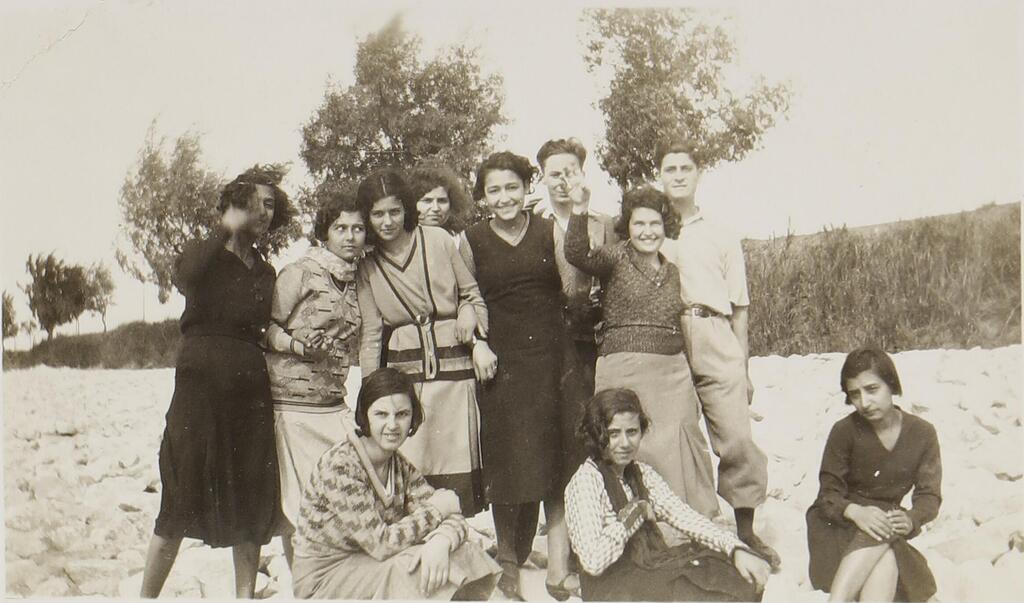

A group of Jewish youths in Egypt
(Photo: Yardena Dagan Collection, the Digital Archive for the Preservation of the Heritage of Egyptian Jewry, Younes and Soraya Nazarian Library, University of Haifa, in collaboration with the Joseph and Racheline Barda Chair for the Study and Research of Jewish Heritage in Egypt)
The 1954 Lavon Affair then rocked the community. Some community members were involved in an Israeli plot to inflame tensions between Egypt and Western powers. The affair, named after then-defense minister Pinhas Lavon, failed and resulted in the execution of two Jews, Dr. Moshe Marzouk and Shmuel Azar, and the imprisonment of others.
"The Jewish community was terrified. Whoever could, fled – mainly the better off and those with foreign citizenship,” explains Prof. Nahem Ilan, head of the Cairo Martyrs Memorial Fund.
“Personal and community safety and peace of mind were damaged in three main waves. Firstly, the Lavon Affair. Israel later helped community members come to Israel and we can say that there is no real community living in Egypt today.”
Ilan notes that “The Lavon Affair was a terrible blow for the community in Egypt as the Egyptians linked Judaism to Zionism and viewed Egypt’s Jews as traitors after the affair. When the cells were caught, the Egyptians burnt down and took over businesses and arrested people from the Jewish community. The 1956 Sinai campaign constituted a further blow to the community, and the Six-Day War was the final nail in the coffin."
Splendid Jewish community came to an end
After Nasser nationalized the Suez Canal in 1956, Britain, France and Israel attacked Egypt. Following the campaign, the Egyptian government expropriated Jewish property as part of the expropriation of the property of anyone trading with either Britain or France. Many Egyptian Jews were arrested or deported.
12 View gallery
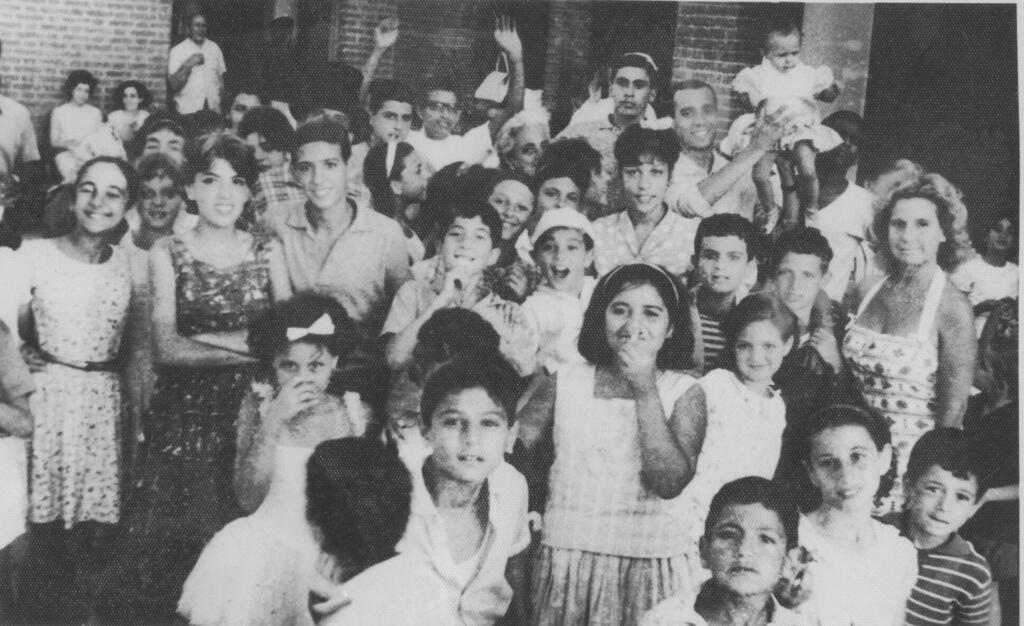

Children in Jewish summer camp in Alexandria, 1965
(Photo: Fortuna Asher Collection, the Digital Archive for the Preservation of the Heritage of Egyptian Jewry, Younes and Soraya Nazarian Library, University of Haifa, in collaboration with the Joseph and Racheline Barda Chair for the Study and Research of Jewish Heritage in Egypt)
The 1967 Six-Day War led to further deterioration in relations between Egyptian authorities and the local Jewish community. On June 5, the first day of the war, almost all (500-600) of the community’s men were arrested and imprisoned with no food or water. Zewi says that “Most of the remaining Jews were tortured and imprisoned in horrific conditions, humiliated and beaten bloody by Egyptian officers until their release and deportation when the war ended.”
In 1968, Egypt's Jewish community still numbered some 2,000 people. By 1971, there were almost no Jews left. In 1996, the community numbered less than one hundred and now only a tiny number of Jews live in Egypt.
And this is how the story of a splendid 2,500-year-old Jewish community came to an end.





